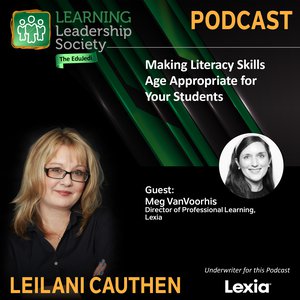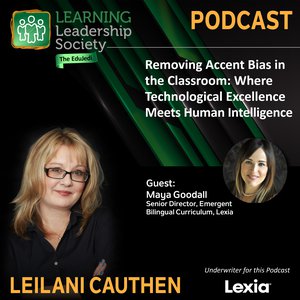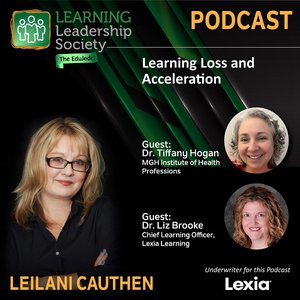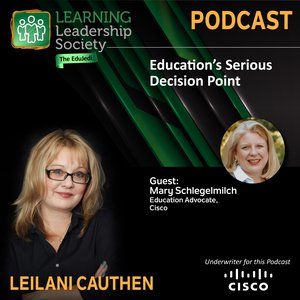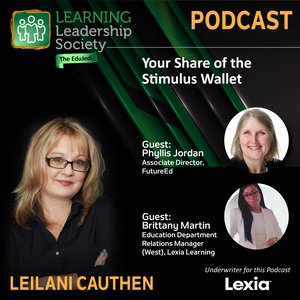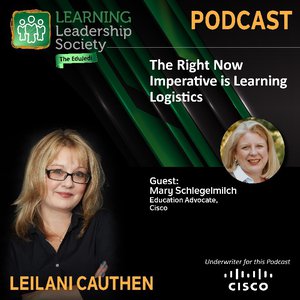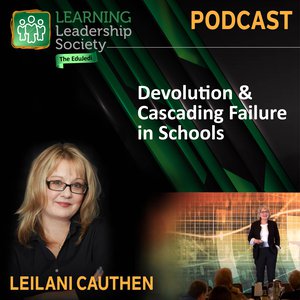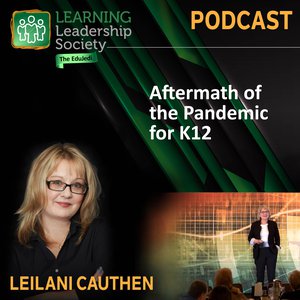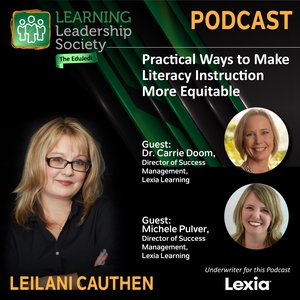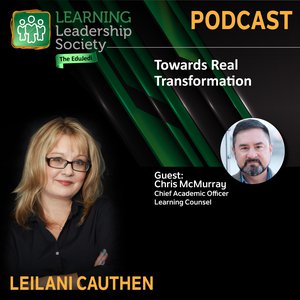
Podcasts with Host LeiLani Cauthen, Author, Researcher and Thought Leader
Topics may include:
Education Legislation Change; Trends Analysis; Balancing AI with Humanities; Schooling Alpha Generation; Future Learning Structures; Any EdTech; UI/UX for Learning; “Science of” Curriculum; Tech Model Architectures; Hybrid Logistics; Networks; Security; Identity and Privacy; Change Management; Strategy Development; Trends; Research; Organizational Planning; Learner Motivation; Experiential or “Expo” Learning; Leadership & Planning
Unique Perspective
“People don’t know what they want until you show it to them. That’s paraphrasing one of Steve Jobs’ famous quotes. Today in education, there are alternatives to traditional public schools that are not necessarily alternative. Yet the mood of society is practically mutiny against traditional schooling in its aspirations for something different, but to what? They don’t know. Certainly, a lot of school leaders think they know, but often the evidence is in their practice that they don’t really see how things should work today in teaching and learning because of tech.
Are we understanding everything we need to about true structural shift away from the industrial age models? Choice is no choice at all if you don’t understand structure and, particularly, the fact that tech changes everything. It’s not the individual devices and bits of software or the teacher’s practice, it’s the sum of the effect, and more interestingly, which technology or logistics or trend reckoning or teaching method is missing and unapplied.
The most important thing is to talk about, to show, the actual future."
Listen in as LeiLani hosts talks with both education and tech company leadership, presenting a unique perspective from her background as a researcher, author, technology developer and strategist.
Making Literacy Skills Age Appropriate for Your Students
As education embarks on pandemic recovery, the mission of continued support for literacy skills beyond early elementary grades is emerging as vital. What does this mean for teachers needing solutions for literacy skill gaps after those foundational school years? Listen in as Host LeiLani Cauthen discusses structured literacy strategy through bite-sized professional development with Meg Van Voorhis, Director of Professional Learning at Lexia.
Removing Accent Bias in the Classroom: Where Technological Excellence Meets Human Intelligence
Listen in to guest Maya Goodall, Senior Director, Emergent Bilingual Curriculum from Lexia as she informs us about accent biases and how technology is coming to the rescue. Host LeiLani Cauthen marvels at the ingenuity of this latest technological breakthrough that uses Artificial intelligence (A.I.) alongside advanced speech recognition and human intelligence to help students from many languages with English language development. Learn important points about capitalizing on learning in a foreign language to advance English language learning. Hear the thinking around how supporting heritage languages creates more culturally sustaining learning environments where all students can equitably feel welcome and advance in their learning.
Learning Loss and Acceleration
A discussion with Dr. Tiffany Hogan, MGH Institute of Health Professions, and Dr. Liz Brooke, Chief Learning Officer, Lexia Learning, about what the post pandemic research is showing about learning loss. Guests mention that over thirty States are implementing laws or policies around evidence-based instruction. Further discussion about the challenges of learning loss and acceleration for students, including how teacher training is bringing a new level of precision to teaching using professional grade courseware. Don't miss this podcast for the points being made and personal stories about the meaningfulness of addressing learning loss.
Education’s Serious Decision Point
In this episode of the Learning Leadership Society Podcast, your host, Learning Counsel News Media and Research CEO LeiLani Cauthen talks with Mary Schlegelmilch, Education Advocate at Cisco. They discuss the post-pandemic world, and the technology-driven changes that will catalyze an increasingly bright future among learners in this world.
Your Share of the Stimulus Wallet
In this episode of the Learning Leadership Society Podcast, your host, Learning Counsel News Media and Research CEO LeiLani Cauthen talks with Phyllis Jordan, Associate Director of Future Ed, and Brittany Martin, Education Department Relations Manager at Lexia Learning. “The Learning Counsel has been tracking Stimulus funds and spending with our big national surveys,” said Cauthen. “There's anywhere from $140 billion and maybe as much as $171 billion still in the game for K12. And a lot of that money is the last act, which is going straight to districts, so the states don't get to play funny money with it. The districts have to spend it and we're imploring them to do that, and most of it is voiced by that act towards technology. So, let's talk about this. What have the two of you been hearing?”
The Right Now Imperative is Learning Logistics
What is logistics when it comes to education and learning? This podcast defines them and goes further, hosting Mary Schlegelmilch from Cisco, a seasoned educator who consults schools and Cisco itself about where education is going. Comments on the perfect storm of teacher shortage, personalization demand and a lack of reasoned workflow are punctuated with a vision of network maturity to meet the future. Progress that elevates human teachers with a surround of tech, potentially also changing the way space and time are used, are part of the lively discussion.
Devolution & Cascading Failure in Schools
Research sourced from multiple industries and the definition of both devolution and cascading failure are the topics of this podcast. The mass teacher shortages are mirrored in other industries, and some new data from the insurance actuaries are indicating part of the “why.” At the end, LeiLani challenges listeners with the key questions about meeting challenges in K12 arriving as soon as Summer 2022.
Aftermath of the Pandemic for K12
In this podcast, LeiLani discusses the teacher shortage, what teachers were doing during the lockdowns, video conference call fatigue, the face of consumerized learning and the consumer awakening during. The perfect storm of these things plus the “short form versus long form” learning issue is discussed as influencing what schools need to think about post the pandemic.
Practical Ways to Make Literacy Instruction More Equitable
In this episode of the Learning Leadership Society Report, your Host LeiLani Cauthen speaks with Carrie Doom and Michele Pulver, both with Lexia Learning. With no holds barred, Cauthen lays it on the line, asking the team from Lexia, “Why is literacy at the heart of educational equity?”
According to Pulver, “Literacy is at the heart of equity because it's the foundation of everything that we ask our students to do. 85 percent of what we present to students is based in text. Kids have to be able to read to participate in classroom activities, classroom instruction, and to be ready for college and career. We know that the educational landscape is not equitable right now. We know now, looking backwards at the pandemic; it shined a glaring light on the fact that access to technology is not equal.”
Doom added, “having a high-quality educator, not by chance, but by design, is critical, knowing that best practices that are rooted in neuroscience and cognitive science in the way that we teach children to read, and teaching children to read is the key that unlocks the door to opportunities across their lifetime.”
Don’t miss this critical podcast: get the facts.
Towards Real Transformation
In this episode of the Learning Leadership Society Report, your Host LeiLani Cauthen speaks with Chris McMurray, the Learning Counsel’s new Chief Academic Officer. As the Learning Counsel begins direct engagements with schools and school districts, Chris McMurray will take the point and help guide them towards real transformation. According to Cauthen, “There's a new future being built. First, there's a teacher shortage and almost every single district was talking about that. And the few that weren't were experiencing other elements of the perfect storm, which is they're losing students, there's an attrition to the homeschooling movement and alternatives, that is just massive.”
“The reason we're deepening the service level from the Learning Council to school systems is because they need help, somebody to come alongside who not only has the crystal ball, but also has the implementation experience to do the things now required of school systems, said McMurray. “We've put together a nice package of supports, including Advisory Schools and Hybrid Logistics, within our Innovation Services, a division of the Learning Council that provides those much needed consultative advisory services.”

